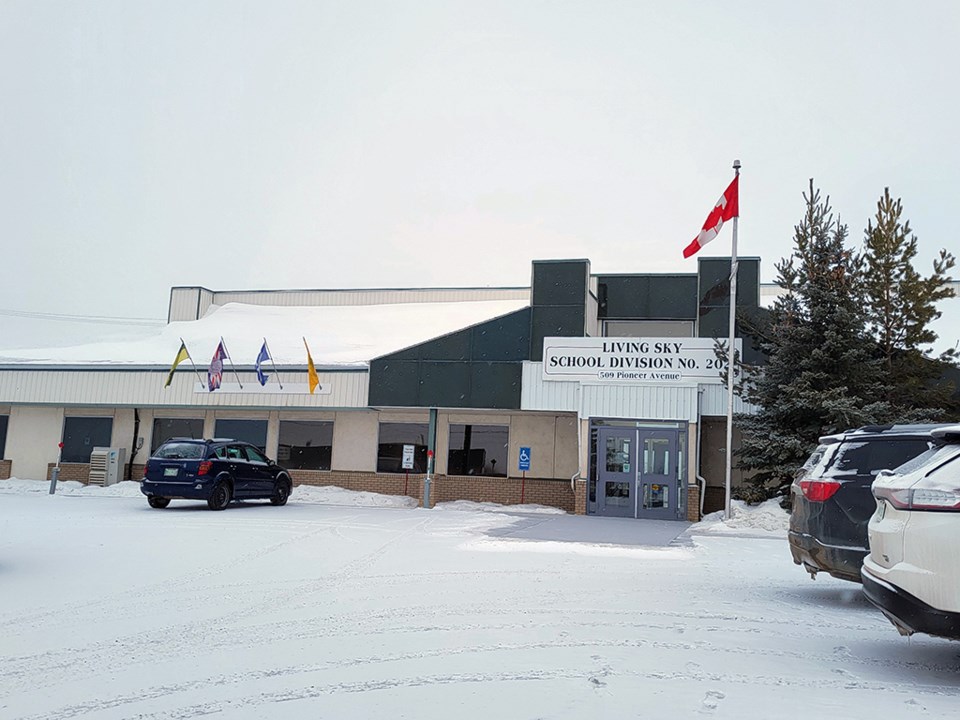THE BATTLEFORDS - Snow days were a thing of the past in Cut Knife, Maymont, and Luseland schools during winter this year, as LSSD has been trying a new Winter Learning Pilot that sees students working online if the weather is too bad for buses to run.
Superintendent Ruth Weber, Maymont principal Kim Cottini, Cut Knife principal Jeff Barrett, and Luseland teacher Micheal Hagel spearheaded the pilot after hearing concerns from parents and other teachers that students were missing too many school days.
“In Luseland, when there are no buses, we’ve had no new learning, and because of that, not a lot of attendance…we've also noticed the number of (snow) days have been increasing over the last couple years,” Hagel said during a visit to the LSSD at their March 8 meeting.
“When you start getting up into that 11, 12, 15 days, it’s a lot of lost learning.”
After looking at the data, the group found that some schools in the division were experiencing frequent student absences due to weather.
Determined to find a solution, the group held a concept meeting on April 1, 2022, continuing with parent surveys and staff meetings in May and school visits to Luseland, Maymont and Cut Knife by Superintendent Weber at the end of June.
Following consultations with several stakeholders, including parents, teachers, HR, and IT, among others, the program was ready to be tested.
Albeit, Nov. 1, 2022, was the first winter learning day for all three schools following a dramatic start to winter.
“This came at us a little faster than we had anticipated or had hoped. I think we wanted a little bit more time, but when you’re dealing with mother nature and the uncertainty that comes with that, obviously you can’t,” Barret said.
Although in the beginning, the program was very structured and rigid, it’s now evolved to become less strict to better fit the needs of students and their families.
“We’ve come a long way…we quickly realized we needed a lot more flexibility in that,” Cottini said.
But it was also a challenge to balance the needs of students who were encouraged to come to school if they could travel there safely and those who were unable to make it to school and were working online instead.
“The first day was very hectic because it was a surprise…we weren’t expecting it that early,” Cottini said, adding that poor communication was the main reason, as well as a lack of understanding as to how the program would run.
Cottini also highlighted that data showed youth weren’t very engaged, especially in preschool and Kindergarten, but she says this data may not show the whole picture.
“Less engagement means we didn't have those students check-in, they didn't engage online with their teachers,” Cottini said, adding, “I need to find a better way to be collecting that data…they could be doing their work asynchronously”
Cottini says the most important thing she learned from the project pilot was that the project was taking away fun days from students, and due in part to the rigid schedule, she forgot about the fun.
“We’re really looking at getting feedback for students because it isn't just sitting down and completing a project for five hours,” Cottini said, adding that they’re looking at stem opportunities and competitions and that she was able to teach students crib and played board games.
For Cut Knife, Barrett found that before the program, only 20 per cent of students were attending on snow days. Now, that number is up to 60 per cent.
“I think one thing we have heard from families was that they were more willing or more prepared to drive their students into school. We actually saw an increase of students in person, relative to the students that were working from home,” Barrett said.
Speaking for the success of Luseland, Hagel said,
“...based on the attendance we used to have, this has been a success,” adding that the completion of projects, credit attainment and online engagement were all metrics that can be measured to understand the program's success.
“A big thing in Luseland this year has been respect for learning…last year, we had 15 days where the buses weren’t running,” Hagel said.
Due to low attendance rates when the buses weren’t running, Hagel feels it contributed to a culture where learning didn’t matter as it should.
“Those days where there was no new learning, and those days when learning didn’t seem to matter, it seemed to make learning harder on other days,” he said because students wondered if it didn’t matter on snow days, did it matter at all.
“Now learning matters every day.”
Superintendent Weber notes that some schools may see this expand to them in the future to help other students who can’t make it to school during days when the buses aren't running due to weather.
“We’re just looking right now at what works and what needs tweaking. And what would be dropped for next year,” she said.
“There is always the question. Are there other potential schools that could benefit from on-boarding winter learning next year? It’s definitely not a program that works everywhere, but there are a couple of potential schools,” Weber said, which includes possibly Hafford and Spiritwood.
“We will do a retrospective. I don’t think I dare say that we’re done with our winter learning days for the winter, but once maybe by May, we can decide that we’ve wrapped it up… It’s exciting to see,” Weber said.
“It’s really great, you guys, it’s taking a problem that’s been out there forever...I just think it’s spectacular, thank you…it’s awesome, way to go,” Brenda Vickers said.




